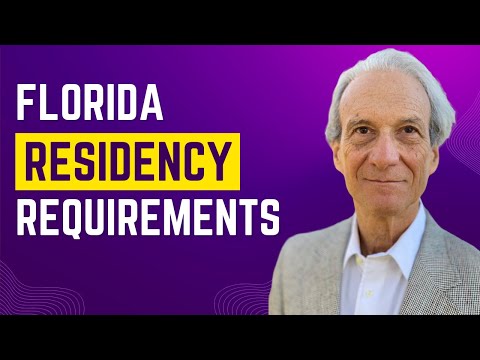What Is Florida Residency?
Florida residency refers to establishing Florida as your primary and permanent home. To become a Florida resident, you must physically reside in the state, have a Florida address, and demonstrate intent to remain.
There is no minimum time to form this intent. A person could form an intent to establish Florida residency immediately upon moving to the state.
Establishing residency in Florida is attractive because the state has no income tax, strong asset protection laws, and offers discounted in-state tuition. However, the requirements for becoming a Florida resident vary depending on your goals. Different programs, like tax residency or tuition benefits, have specific requirements.

Steps to Establishing Florida Residency
- Live in Florida for at least 183 days per year.
- Obtain a Florida driver’s license or ID card.
- Register to vote in Florida.
- File a Declaration of Domicile.
- Claim the homestead exemption.
- Use a Florida address on all legal paperwork.
- Physically move valuable household items.
- Maintain a physical mailing address.
Update for 2025
As of January 2025, there has not been any proposed legislation to change the residency rules in Florida. Florida residency remains a powerful tool for asset protection in 2025, with the state’s homestead exemption continuing to shield primary residences from creditor claims.
Recent court developments have reinforced the advantages of Florida residency. Several court decisions in 2024 have upheld a judgment debtor’s ability to shield their homestead from forced sale.
There is no pending legislation to implement an income tax for Florida residents.
Establishing Florida Residency for Tax Purposes
To become a Florida resident for taxes, you must:
- Reside in Florida for 183 days per calendar year.
- Maintain a physical presence in Florida most of the year.
- Have a stronger tie to Florida than the previous state.
- Document your residency by updating your driver’s license and voter registration.
The state from which you are moving sets its rules for qualifying for Florida residency to avoid state taxation.
A tax professional in the taxing state can explain the taxing state’s requirements and guidelines for determining whether or not you have become a Florida resident.
We help protect your assets from creditors.
We give customized advice to clients throughout Florida. Get answers from our attorneys by phone or Zoom.

Establishing Florida Residency for Asset Protection Purposes
Only Florida residents can take advantage of Florida’s liberal asset protection laws.
Owning property is not enough to establish Florida residency for asset protection purposes. The law requires that you demonstrate your intent to establish your primary place of residence in Florida.
When “going home” means you are returning to your residence in Florida, and when your mail is sent to your Florida address, you are probably a Florida resident.
Florida law defines a permanent residence as the place where a person has his or her true, fixed, and permanent home and principal establishment to which, whenever absent, he or she has the intention of returning.

Establishing Florida Residency for In-State Tuition
To qualify as a Florida resident for in-state tuition at public universities, you must establish residency at least 12 months before classes start. Residency requirements for tuition are stricter than those for general residency. You must provide a range of documents to prove you live in Florida, including:
- A Florida driver’s license.
- Lease agreements or property ownership documents.
- Utility bills showing your Florida address.
If you are financially independent and over the age of 24, these documents are sufficient. If you are under 24, your parents must provide similar proof of residency.
You can lose your Florida tuition residency status if you have not lived in the state within the previous 12 months.
Our most popular article…
We provide a complete guide to Florida asset protection law.
How Long Does It Take to Become a Florida Resident?
Many income tax states use a 183 Day Rule to establish state residency in Florida
Under the rule, the taxing states require that a person looking to declare residency in Florida must reside in Florida for at least 183 days (in other words, one day more than six months).
Any time spent in the state can count as a day.
There is no waiting period to establish Florida residency for asset protection purposes. As soon as you form the intent to make Florida your primary home, you are a Florida resident, and you are entitled to Florida’s asset protection benefits.
Asset Protection Advantages for Florida Residency
Florida residents enjoy some of the best asset protection laws among any state in the country.
Florida Homestead Exemption
The most well-known protection is the Florida homestead exemption, which protects a person’s homestead from forced sale by a judgment creditor. The exemption has no dollar cap, making it one of the most powerful tools for asset protection in the country. The only limitation is on acreage: up to 1/2 acre within a municipality and up to 160 acres outside city limits.
Tenants by the Entirety Protection
Florida offers one of the most expansive tenants by entireties protections in the nation. This legal concept allows married couples to jointly own property in a way that shields it from the creditors of either spouse individually. It can apply to bank accounts, real estate, business interests, and even personal property like furniture and equipment.
Presumption of Tenants by the Entireties
Under Florida law, any personal property acquired by a married couple is presumed to be owned as tenants by the entireties. This shifts the burden to the creditor to prove otherwise, adding an additional layer of protection for married individuals.
Protection of Head of Household Earnings
Florida statutes exempt the earnings of a head of household from garnishment. Protected earnings include wages, salary, commissions, and bonuses. A head of household is defined as someone who provides more than half of the financial support for a person they have a legal or moral obligation to support—typically a child or spouse.
Timing Asset Protection with a Move to Florida
There is no legal penalty for moving to Florida to take advantage of its asset protection laws, even after a judgment has been entered. Purchasing a new homestead property after relocating to Florida can immediately shield that asset from creditors.
Potential Complications with Out-of-State Court Orders
While moving to Florida is legal, complications can arise if another state has issued a court order restricting the transfer of assets. Such orders may impact a debtor’s ability to make certain moves, depending on the scope and enforcement of the injunction.

Can You Be a Resident of More than One State?
Under federal law, dual residency is not allowed. You cannot be a resident of more than one state. You have own property in multiple states, but you can only be officially a resident of one of them.
A domicile is your true home, where you intend as your family’s base.
In some rare situations, a person could be a resident of two states for state income tax purposes. This situation occurs when a person is domiciled in one state, but lives in another state for more than 183 days. This could cause the other state to impose income taxes.
Frequently Asked Questions
What’s the fastest way to become a Florida resident?
The fastest way to become a Florida resident is to establish a permanent home in the state, update your driver’s license, register to vote, and file a Declaration of Domicile with the local county clerk. You must still be physically present in the state for at least 183 days.
Can you keep your out-of-state driver’s license and still be a Florida resident?
No, you must surrender your out-of-state driver’s license and obtain a Florida driver’s license to establish legal residency in Florida.
What documents do you need to prove Florida residency?
To prove Florida residency, you need documents like a Florida driver’s license, vehicle registration, voter registration, and a Declaration of Domicile.
Do you have to file a Declaration of Domicile to establish residency in Florida?
Filing a Declaration of Domicile is not required to establish Florida residency, but it can help clarify your intent to make Florida your permanent home.
How does becoming a Florida resident affect your taxes?
As a Florida resident, you can benefit from the state’s lack of income tax, which may reduce your overall tax burden depending on your previous state of residence.
Sign up for the latest information.
Get regular updates from our blog, where we discuss asset protection techniques and answer common questions.










